Uptown Ruler (Soul Gestures In Southern Blue Vol. 2)
A blues cycle for quintet and sextet that, as Wynton says of the title track to THICK IN THE SOUTH, comprises “a condition, a location, an attitude, a pulchritudinous proposition, and an occurrence,” SOUL GESTURES IN SOUTHERN BLUE ranges through the full glory of the blues tradition. Among other things, it introduces us to the Uptown Ruler, a mythic New Orleans hero whose “persona is obviously multifaceted,” Wynton remarks, because he is “accepted without question in the houses of worship . . . [and] ill repute.” Most of all, the cycle reveals the complex human message of the low moaning blues that echoes in the foghorn of a riverboat, the lament of a spiritual, or the simmering dishes of a home cooked meal.
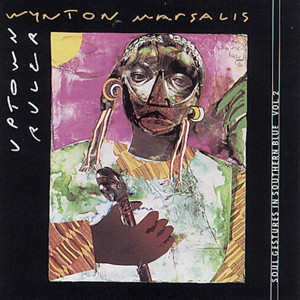
Album Info
| Ensemble | Wynton Marsalis Quintet |
|---|---|
| Release Date | July 30th, 1991 |
| Record Label | Columbia |
| Catalogue Number | 468660 2 |
| Formats | CD, Digital Download, LP |
| Genre | Jazz Recordings |
Track Listing
| Track | Length | Preview |
|---|---|---|
| Psalm 26 | 1:28 | Play |
| Uptown Ruler | 11:09 | Play |
| The Truth Is Spoken Here | 6:49 | Play |
| The Burglar | 8:37 | Play |
| Prayer | 6:26 | Play |
| Harmonique | 4:53 | Play |
| Down Home With Homey | 11:54 | Play |
| Psalm 26 | 1:36 | Play |
Liner Notes
Those in the mood for a classic, need to give Uptown Ruler, the second volume of the Wynton Marsalis Blues Cycle, some serious play. It will win you over, either swiftly or casually, and by the time you have come to know the different tunes and relish how they pull you from one mood to another, you might find yourself in the barbershop bragging about the achievements heard here the way McKinley Menefield was recently observed doing one Saturday afternoon when the clippers were buzzing and the scissors were snipping:
“I got the first one, the one with Elvin Jones and Joe Henderson, and it was authentic as sweet potato pie, black-eyed peas, corn bread, and greens. Knock you down with that swing. Make you think about the blues. That’s right. It will. But I didn’t figure I would get me a bunch of something just because they call it a snuff dipping Blues Cycle. I said to myself, I got your cycle right here.’ Me, I assumed the music was just some scraps they were going to try to make you think had something to do with each other. You know how these record companies can do. I was wrong, man, was I wrong. All of that stuff is good as you want it to get. You got to watch that Marsalis. You got to watch him. That boy has been blessed. He came in here with something.”
Menefield paused, looked in the shop’s long mirror at himself, checked out both profiles and the top of his haircut, then smiled at himself with satisfaction.
“I heard tell that boy can’t really play,” said L. T. McWilliams. “You know I don’t listen to no jazz, but that’s what I heard.”
You heard wrong. That boy is playing. He’s playing his cakes off. When I was listening to that Uptown Ruler, the one I’m savoring right now, I had to say “Chill down, young Marsalis, don’t be so mean. That boy is mean. I imagine he don’t even know the address of some jive. His music is serious.”
“That’s what they say,” interjected McWilliams, “that he’s too serious. Like I say, I don’t know, but that’s what I’m hearing.”
“How can you be too serious when you trying to make something wonderful? Tell me that? Is Michael Jordan too serious? What’s wrong with being serious if you’re trying to do something right?”
“I’m just telling you what I heard.”
“You better listen to something else. People better get ready for this Uptown Ruler – if you like music. If you don’t there’s nothing I can say to you anyway. But I’ll tell you this: This Marsalis is the one we been waiting for through all these trends of ignorance. And boy got to be from New Orleans, too. That’ll tell you something right there. I think the boy got himself a musical mojo band myself. But we don’t need to go into all that. I’ll just say this: If you think you like music and you don’t like that Uptown Ruler, well ain’t but one thing going on: you and a fool feel the same way about the world.”
“Mr. Menefield,” said Doowoo Seven Seven, “the trouble with Marsalis is you can’t get up on nothing sweet playing his music. You can’t get no play from no tender butter playing that stuff.”
“What you talking about?”
“I’m talking about women: Tender butter.”
“That’s what I thought. You don’t know what you talking about, youngster. Marsalis helped me get my sweetheart of swing, Ardella Jefferson. She heard some Marsalis music out the window and come down from the floor above and all the way at the end of the hall so she could hear it better. That’s how we started, listening to Hot House Flowers.”
“Maybe so. But I know if she likes that stuff, she can’t be fine.”
“Fine? Ardella Jefferson? Are you out of your mind? You must never have seen her. She put the “f,” the “i,” the “n,” the “e,” and the exclamation point on fine. You ain’t seen nobody fine as her – not nobody that liked you.”
“Seven Seven,” McWilliams said, “Ardella is definitely fine, and she got her some class, too.”
“Well…”
“Well is a hole in the ground,” Menefield continued. “Ardella likes her some pretty music, and if Marsalis didn’t play anything sweet, she wouldn’t like him as much. I come up to her place and she’s in there listening to Luther, but she’s listening to Marsalis, too. On this Uptown Ruler, now she just loved that saxophone player Marsalis brought out here. Todd Williams, boy from St. Louis. He got the St. Louis blues in that saxophone. Ardella said she liked the way he played so silky. She likes that bass, that boy Veal, and she loves the swing Herlin Riley puts on his drums. And what the hell you going to say about Marcus Roberts? Boy plays the mess out of the piano, plays the mess out of it!”
“I’m listening to what’s going on now. You just talking about something old and somebody who ain’t got himself up to date. Marsalis thinks he’s in the 50′s or something. He’s an old man in a young man’s body.”
“Old? Todd Williams was 20 when they recorded Uptown Ruler. Besides, what you saying doesn’t amount to an insult: It’s a compliment. Before your time, back when it wasn’t unusual for people to have sense, when they said somebody had an old soul, they meant that somebody had been lucky enough to avoid getting hypnotized by youthful ignorance.”
“He ain’t working on nothing new!”
“How would you know? You know anything about jazz?”
“I listen to what young people are doing, what’s out here right now. The past is over with.”
“Bet you think Marsalis should be one of these people out here can’t sing so they just talk over somebody else’s rhythm.”
“They working on something new.”
“New? I had stopped doing that by the time I was 12 years old. You think I can’t do that? Boy, I’ll rhyme you around the corner.”
“What you talking about is old.”
“Every time you look around one of these boys you think are so new got to pay somebody for a beat they stole off a record made in the James Brown era 30 years ago, or maybe 110. Marsalis and his musicians are looking for the best there is to offer, and they don’t let somebody else tell them what they got to do. He’s got all kinds of young people following him because he’s not afraid to respect something. He understands knowledge. You think Magic Johnson shouldn’t have played with Jabar? Marsalis plays with the best. He doesn’t care how old they are or how young they are. That’s why when you listen to something like Uptown Ruler, you hear some young men taking care of some serious business. You hear some swing, you hear some blues, you hear some sweet talk coming out of those horns. But I got business to take care of, and like they say in the South, Never argue with a fool because somebody looking on might not be able to tell the difference.” But if you want to learn something, boy, kindly come on up to my place. I’ll lay some good music on you, some very good music. I got to go. I got to meet my sweetheart of swing. I got to see my Ardella. Later.”
As we step back from the barbershop, it’s not hard to hear why Menefield was so taken by this volume of the Blues Cycle. The comprehensive quality of Uptown Ruler is as enjoyable for the listener as it must be inspirational for serious musicians and intimidating to those who would falter into the aesthetic pigsty of the fraudulent. It moves with confidence toward that plane of achievement on which Ellington functioned, the point from which expression can come in such sophisticated terms and with such lulling beauty or lucid exuberance that the deep sweat of the thinking is no more obvious than the ingredients are in a particularly delicious sauce; all you experience at first is your taste buds swooning before the flavor. One of the finest documentations of a working quintet ever recorded, Uptown Ruler is yet another pinnacle of Marsalis’ conception – the orchestral rhythmic intelligence of the bass and drums, and motific continuity of the improvising, the easeful sound brought to very difficult material, and the group’s ability to mutualize the high-minded and the down-home for the charming spunk of lyric momentum of any tempo or within any selected groove’s beat.
None of these accomplishments can be separated from the refined to greasy skills so confidently exhibited by these specific players. Each of these musicians proves that Marsalis is one of the best choosers of talent in the history of the music. Herlin Riley is already a great drummer. His ability to keep and vary the levels and dimensions of grooves, while maintaining the swing is so effortless in its enriching of the ensemble sound that one might miss it at first. Then the details of timbre that he has command of – his balance of the trap set’s registers from the rims to the bells of the cymbals and even their sides, the touch he uses on his drums and the sometimes conversational clarity of his independent coordination – all come together for the same kind of individuality so obvious in his drum solo on the title track. Reginald Veal is the third prodigious talent of the bass that Marsalis has brought to us, following Charnette Moffett and Robert Hurst. No young bassist plays with more swing or with greater sophistication, rhythmic invention or harmonic drama. His attack links him to the grand masters of his instrument and the originality of his use of pizzicato and arco on “The Burglar” is but one example of the sort of musicality we should expect him to develop. What is there more to say about Marcus Roberts? He is simply the crowned prince of jazz piano. One need only listen to his work on “Down Home With Homey” to hear that claim validated as he pulls out the essences of Monk, Tyner, and Hancock while swinging the ivory off the keys with a motific originality all his own. Todd Williams is shock wave of early wisdom. What other 20-year old could remind you of Wayne Shorter here and there, then as, on “Down Home With Homey,” exhibit such originality of tone, such command, such melodic fluidity, such swing, and such soul? Uptown Ruler was his first record date, and it should stand over the years as one of the most provocative debuts of reed talent we have been fortunate enough to witness.
Marsalis maintains his unacknowledged position as the boss of avant-garde trumpet while continuing the most substantial developments of the tradition. At least since his “Nozz-Moe-King” improvisation on Live at Blues Alley, when he demoted all so-called avant-garde trumpets, Marsalis has continued to expand upon the techniques Rex Stewart brought to “Menelik The Great” 50 years ago but that have been so badly handled by those who have come to the fore in the wake of Don Cherry’s brilliant early work with Ornette Coleman. But the continued development of those options heard on the title track is but one side of Marsalis’ work. He is after a comprehensive approach to his instrument that reflects his personal affection for the entire body of jazz trumpet artistry. This demands of him a broader and broader repertoire of tonal colors, melodic ideas, harmonic surprises, and rhythms. To match that vision of playing, he continues to work on what is surely the most imposing compositional talent of his generation, providing us, as he does here, with structures that are smooth on the surface but rocky below, structures that demand more than a little skill from his musicians. The result is music as unflinchingly spiritual as it is greasy around the fingers and the mouth, as witty as it is intellectually challenging, as full a human experience as we should want from the idiomatic chamber music that is quintet jazz.
The following italicized passages are Marsalis’ descriptions of the Uptown Ruler and the music used to describe him:
The Uptown Ruler is a mythical hero from my hometown of New Orleans. The Ruler is accepted without question in the houses of worship, institutions of higher discourse and intellectual engagement, as well as places of ill repute and lower levels of social intercourse. The Ruler’s persona is obviously multifaceted. He is known for his profound character and his deep humility. It is this humility that allows for his trademark-quality observation unaffected by the cloudiness of an egocentric, judgmental viewpoint. The Ruler’s decisions are based on knowledge, not undigested information or prejudice. That is why he is known as the Chief of Chiefs during the Mardi Gras season.
All of the Ruler’s varied experiences come to bear when he is required to act in the cause of public happiness. At such points, he represents the same sentiments and functions of the blues musician who is called upon to bring differing worlds of experience together, soothe the hearts of wayward lovers, serenade aspirant and practicing romantics, and dispense the justice of accurate observation in the face of imposed misconceptions.
It is because of the Ruler’s ease when confronted by variety, his ability to transcend intimidation, that he is a timeless figure of social significance. Like what is said of angels, he doesn’t have to be up to date because he so clearly perceives the past, the present, and the future at the same time. This allows him to establish a hierarchy in which only the sophisticated, soulful, and concerned are considered public figures of significance. And those who wish to exploit the community life, through apathy masquerading as open-mindedness, or prejudice disguised as the defense of tradition, or greed cloaked in the expensive trinkets and other meaningless symbols of monetary success, are relegated to – though not discriminated against – self-chosen positions of social insignificance. These songs celebrate different aspects of the Uptown Ruler’s persona.
“Psalm 26″ is a chorale which addresses the spiritual philosophy of the Ruler. Its harmonies come from the melodic language of the blues, and it says, to paraphrase the Ruler, that the nature of Soul is spiritual.
“Uptown Ruler” is a contemporary New Orleans blues in 5/4. It uses many devices typical of New Orleans music. Both Herlin and Reginald are from New Orleans and they provide a true Crescent City lope while Marcus, Todd and I identify angles on the joyous attitude of the Ruler in his stomping grounds. We end with a drum solo because the Ruler, like all important personae of the community, is really a drummer. He does everything with a beat and in the groove.
“The Truth is Spoken Here” is the Uptown Ruler’s motto. That is all he speaks and why he is so loved in the community. Written by Marcus, it is a tonal description of one of the Ruler’s most endearing qualities, which is perfectly stated in the last line of “Psalm 26,” “But as for me, I will walk in mine integrity”
“The Burglar” was written by Todd Williams at the age of 17. Though not composed specifically for this album, we have appropriated it because it captures the mysterious nature of the Uptown Ruler’s character. It is this aura of intrigue that makes the Ruler even more beloved and provocative among Crescent City citizens.
“Prayer” is a part of a three movement suite-within-a-suite. It is also tonal testimony that corroborates the Ruler’s attendance at ecclesiastical functions. As a model citizen, the Ruler is known to partake in the type of group worship which strengthens and unifies the community – even though the Ruler himself practices no one religion but believes in the truths espoused by all religions. Written in 7/4 to respect the seventh day, the melody is based on a theme from the third movement of Beethoven’s String Quartet in F Major, Opus 135. But the groove, well, that’s the down-home church call-and-response that the Ruler loves so much.
The next movement, “Harmonique,” is a homage to the Ruler’s intellectual ascription. He believes in study and preparation. Even though this aspect of his persona is the least understood, it is perhaps the most respected. His penchant for long hours of deep contemplation and scholarship is of great renown in the community and is the primary reason that his judgments are always requested. This composition uses one chord (Major 7 Flat 5), which progresses through all 12 keys. The 12 bass notes of this progression become the melody of the next song, a 12 tone blues, “Down With Homey.”
“Down With Homey” is the Uptown Ruler in action. He is a “homey” in the truest sense because his presence always reaffirms all that is warm and beautiful about the community. Ever ready to take up the sword to defend those values that he so nobly represents, the well-swung bass is the sound of the Ruler’s revenge. Even though he is slow to respond, it is with an elegance and style worthy of the swing he represents, for the Ruler knows that swing is the all-inclusive propulsion of the truth.
We conclude this album of the Blues Cycle as we began it, with “Psalm 26,” since everything of importance ends as it begins, by returning to its spiritual essence.
–Stanley Crouch
Credits
Produced by Steve Epstein
Executive Producer: Dr. George Butler
All songs written by Wynton Marsalis except “The Truth Is Spoken Here” written by Marcus Roberts and “The Burglar” written by Todd Williams.
“Psalm 26” (1st Version)
Wynton Marsalis, Trumpet
Marcus Roberts, Piano
Reginald Veal, Bass
“Psalm 26” (2nd Version)
Wynton Marsalis, Trumpet
Reginald Veal, Trombone
Marcus Roberts, Alto Saxophone
Todd Williams, Tenor Saxophone
Herlin Riley, Bass
Chief Engineer: Tim Geelan
BMG Engineer: Dennis Ferrante
Additional Mixing Engineer: Mark Wilder
Recorded Digitally onto The Sony PCM 3324 Digital Recorder at BMG Studios, New York
Mixed onto The Sony PCM 1630 2 Track Digital System at Sony Music Studio Operations, New York
Mastered at Europadisk, Ltd., New York
Cover Artwork: Romare Bearden. Ritual Dancer, Purple Lady. 1987
Wotercotor and collage. 14×11 inches
Estate of Romare Beorden,
Courtesy ACA Galleries, New York, NY.
Exclusive Personal and Financial Manogement:
AMG International, P.O. Box 55398, Washington, DC 20011
Edward C. Arrendell, II/Vernon H. Hammond, III, Partners.
Publishers:
Track 1,2,5,6,7,8: Skaynes Music;
Track 3,4: Pending
Personnel
- Reginald Veal – bass
- Marcus Roberts – piano
- Herlin Riley – drums, tambourine
- Todd Williams – tenor sax, soprano sax
Also of Interest
-
 Videos
Videos
NYE 2013 - Wynton Marsalis Septet live at Dizzy’s Club
-
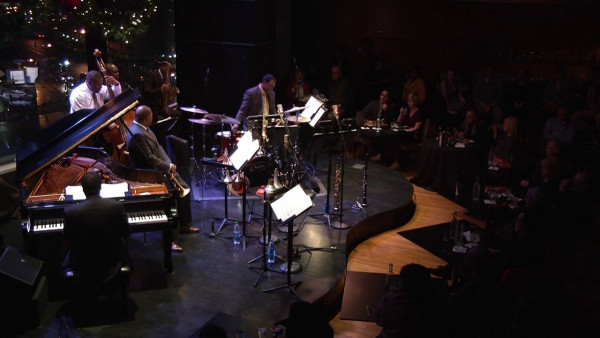 Videos
Videos
Uptown Ruler - Wynton Marsalis Septet at Dizzy’s Club 2013
-
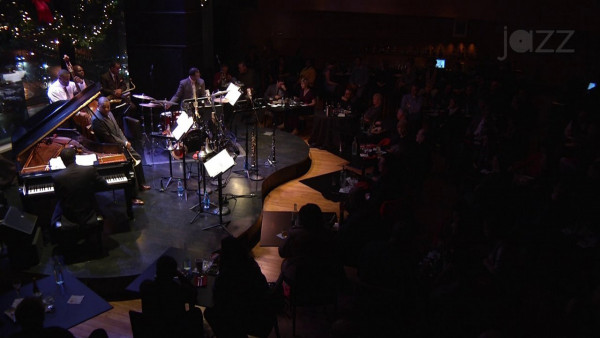 Videos
Videos
Harmonique - Wynton Marsalis Septet at Dizzy’s Club 2013
-
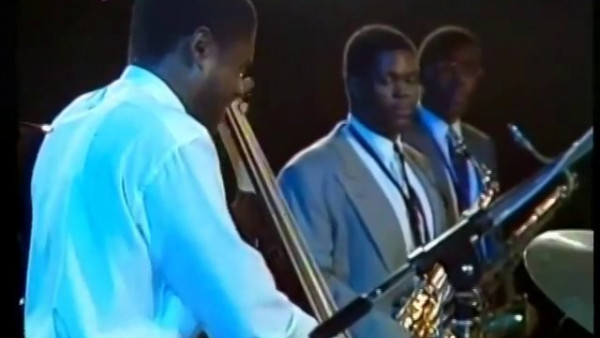 Videos
Videos
Down Home With Homey - Wynton Marsalis Septet in Berlin (1989)
-
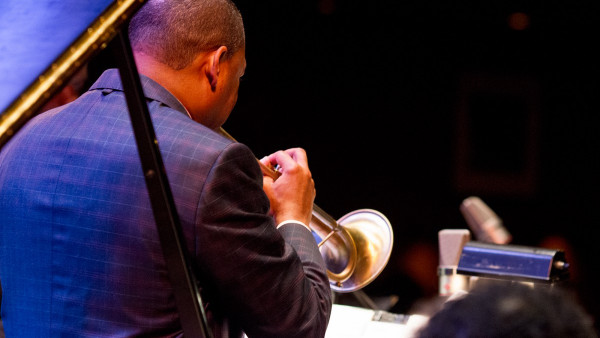 Photo Galleries
Photo Galleries
Wynton Marsalis Septet at Dizzy’s Club Coca-Cola (day #6)
-
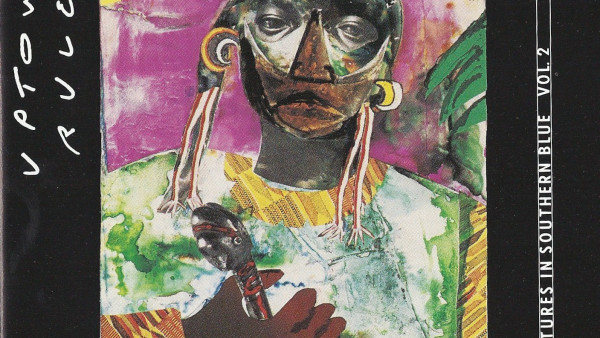 Wynton's Blog
Wynton's Blog
Psalm 26 represents my first attempt to write for more than two horns
-
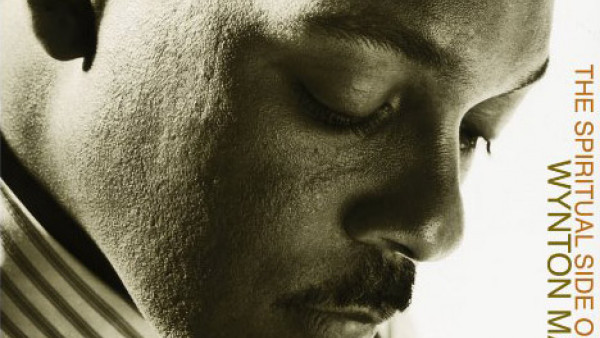 News
News
Wynton Marsalis personally compiles and produces “The Spiritual Side of Wynton Marsalis”
-
 News
News
A change of key - His Septet behind him, Marsalis takes a new direction
